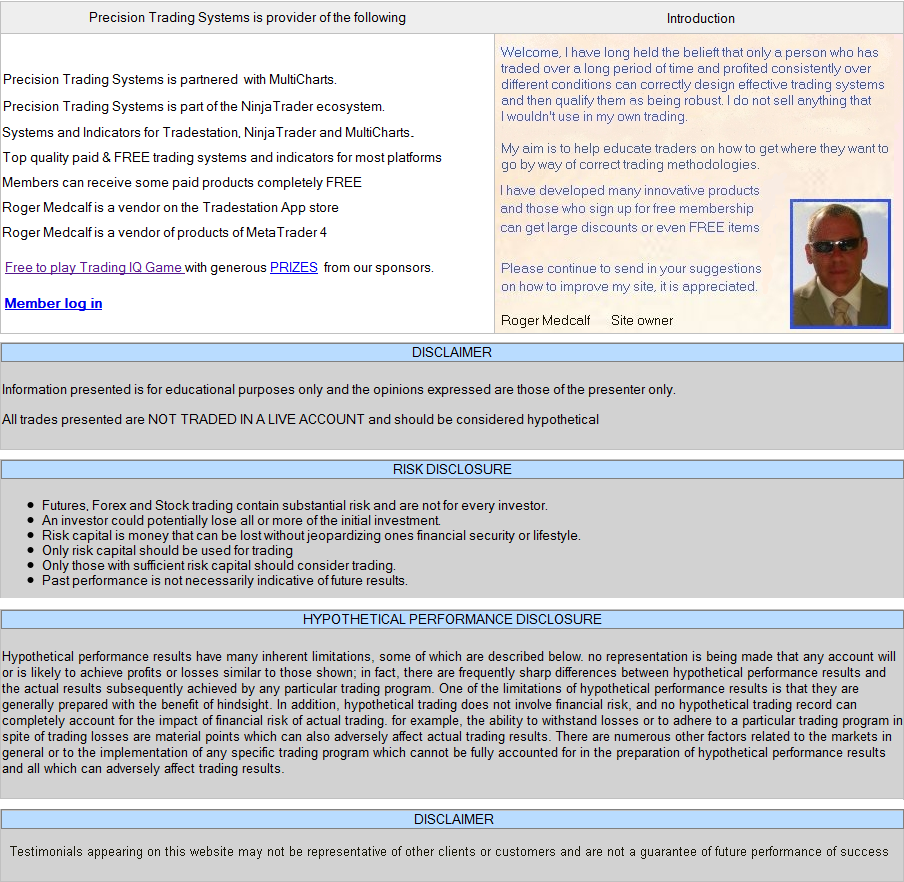

Ed Seykota created this formula, I am just writing about it as its very cool.
Video
below shows the Precision Probability Index trading system which
achieves a good lake ratio. Shown here with speeded up
data
This formula was I believe first created by Mr Ed Seykota a great trader with a razor sharp mind. Featured in the highly regarded book Market Wizards volume 1
Indroduction and concepts of the lake ratio
The lake ratio is a simple to
understand ratio for use in measuring performances of trading
systems and indeed the trading account of a trader or fund manager.
This is based on the equity curve generated by the trader or
the system. In recent times it has become more popular as a tool of
institutions for use in measuring traders risk profiles v profits.
Simplicity = Beauty
You can find out your own personal
lake ratio value by trading a few sessions of the Trading IQ Game
and then viewing the trade report at the end of the session ( you
must be logged in to receive the trade report )
The three
main areas which are used to make the measurement calculation are
Growth rate of account
Depth of draw down of that account
( the greater the percentage of draw down the deeper is the water )
Time that the account is underwater ( the longer the duration of
the draw down the wider the water )
The ideal lake ratio
which all fund managers seek to achieve is the improbable 0.00 and
the higher the number measured the worse the performance.
Here
are some examples
Example No1
In the example below we
can see the red area represents the growth of the account and this
is referred to as "mountain area" when all the cubes of the mountain
area are added up we get 4900
The lake area is counted by
adding up the area of the blue area using the right column to note
the balance of the account
Thus lake area = 600
The to get
the lake ratio we simply take the lake volume divided by mountain
volume
600 / 4900
Lake ratio = 0.1224 ( very good )
Lake ratio formula = lake divided by mountain.
Calculating
area of each is best done by sampling each bar or day or which ever
frequency of data is used.
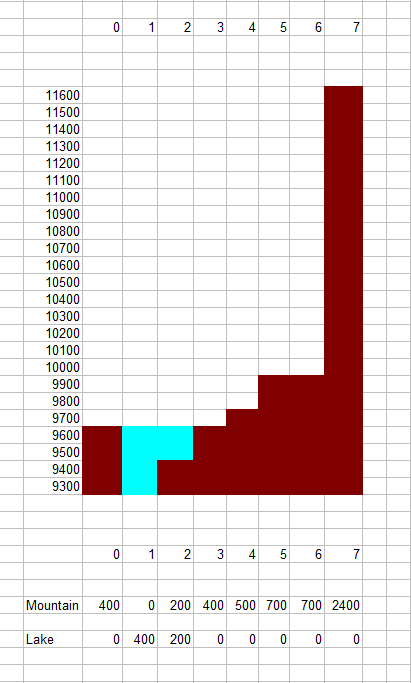
Example No2
In the example below we can see the red area represents the growth
of the account and this is referred to as "mountain area" when all
the cubes of the mountain area are added up we get
Mountain area
= 86
The lake area is counted by adding up the area of the
blue area using the right column to note the balance of the account
Thus lake area = 20
The to get the lake ratio we simply do
lake divided by mountain
20 / 86
Lake ratio = 0.2325 (
good )
For calculation purposes the extreme low of the equity
curve is taken as the base level for measurment and the extreme peak
of the mountain is taken as the high value to measure down from to
get the depth of the water. This procedure runs on a bar by bar
basis so it the highest peak that has occured "to date" if reading
the data from left to right.
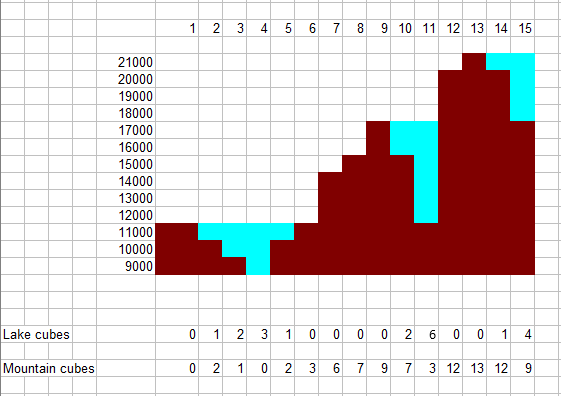
Example No3
In the example below we can see the actual
equity curve of a participant in the Trading IQ Game who achieved an
excellent lake ratio of 0.020 which is lower and much better than
those above.
This metric is used by myself to help me select
traders with strong promise and ability to produce good profits with
low draw downs and short underwater periods.
Lake ratio =
0.020 ( very very good )
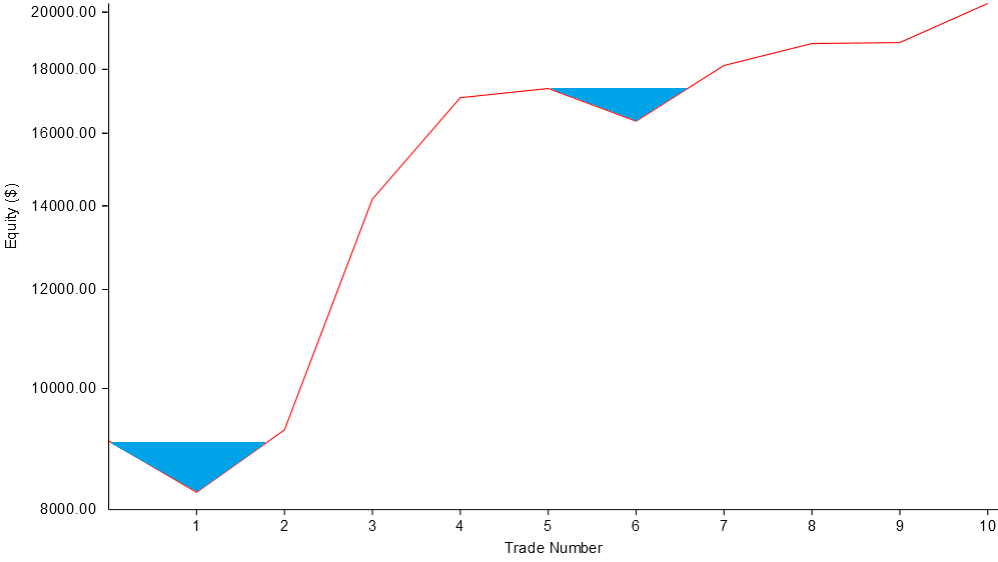
Example No4
In the example below we can see the actual
equity curve of a participant in the Trading IQ Game who achieved
the dream and got a perfect lake ratio of 0.00 which simply means if
you pour
water on the equity curve ( mountain ) then it will not
settle as their are no lakes for it to collect.
This metric
is used by myself to help me select traders with high ability to
produce good profits with low draw downs and short underwater
periods.
Obviously there were only four trades to create this
chart, and having months of trades without ever registering a losing
trade is virtually impossible, but one can understand what fund
managers look for when selecting traders to grow their trade
accounts up.
Lake ratio = 0.00 ( statistically
improbable over a long time duration as it requires no losing trades
)
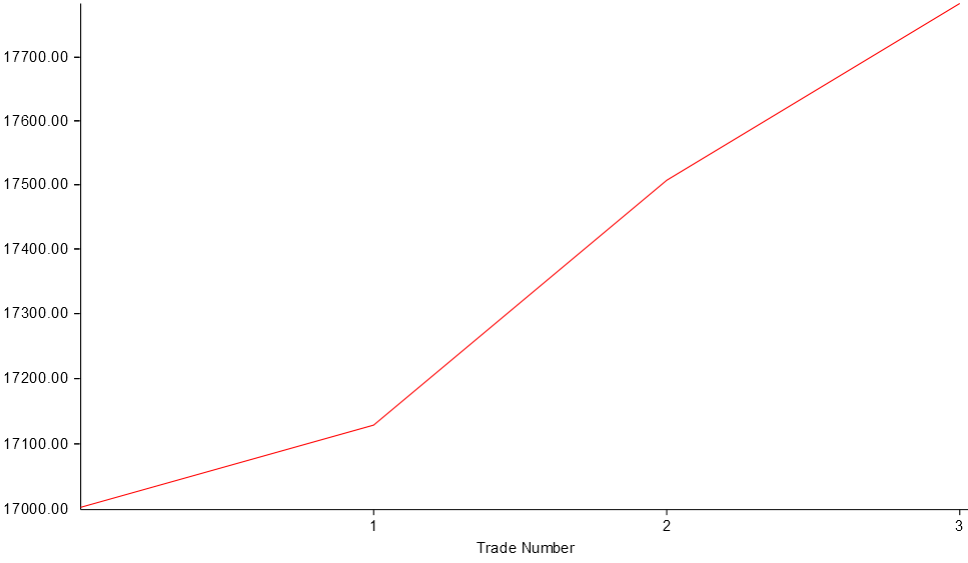
The
original lake ratio article by Ed Seykota is found here (
Some distance down the page )
These pages below will
also appeal to those who enjoy ratios, statistics and calculations.
Price target
computer (
Predicts exact maximum high and low )
Computing optimal risk
( Same method as the Las Vegas card counter Ed Thorp )
1987 crash calculator ( Calculate your
loss or profit if the 1987 crash happens again )
How to test a trading
system ( Video simulation and maths )
Beginners guide to trading part one (
Six parts )
Hedging a portfolio with
traded options
View
the Product guide for all platforms supported
The contact page here has my email address and you can search the site
If you
like what you see, feel free to
SIGN UP to be notified of new products - articles - less
than 10 emails a year and zero spam
Precision Trading Systems was founded in 2006
providing high quality indicators and trading systems for a wide range of
markets and levels of experience. Supporting NinjaTrader, Tradestation and
MultiCharts.
Page Created June 22nd 2023 - New responsive page GA4 added canonical this. 5/5 html baloon
Cookie notice added Video resize nicely
About
